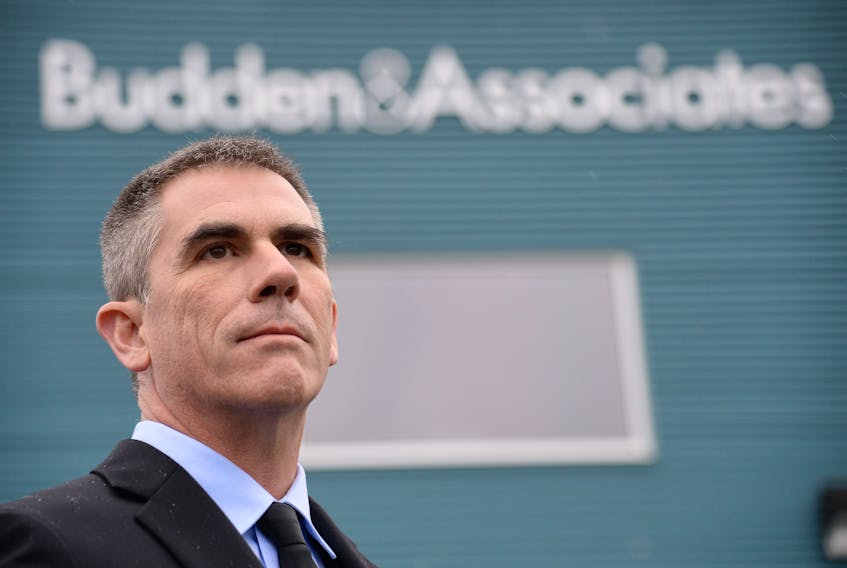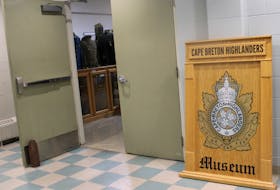ST. JOHN'S, N.L. — Even if the monumental decision had gone the other way Thursday for the now elderly victims of sexual assault at the former Mount Cashel orphanage, one John Doe said he would have felt they gave it their best shot.
But instead there was lightness for him that the fight was finally done, and victory was theirs at last.
When the Supreme Court of Canada on Thursday refused to grant the Roman Catholic Episcopal Corp. of St. John’s leave to appeal a civil decision that held it responsible for sexual abuse suffered by boys at the infamous Christian-Brothers-run orphanage during the 1950s and early ‘60s, the retired educator was elated and grateful to the lawyer who had fought for the victims for more than 20 years.
“They were terrific, absolutely terrific. He is absolutely magnificent. (The firm was) always on a mission and they treated us with so much understanding and humanity,” the man said of St. John’s lawyer Geoff Budden. “I am happy for all the boys, the victims.”
The man was one of four John Doe plaintiffs in the case, which represented about 60 clients in total. One of the man’s four brothers who were also victims of abuse died before the decision came out, as did one of the four John Does.
“I am sad for those who have passed away or are no longer with us,” said the retired educator. “(But) it’s a great day for everybody all around, except for the church. They are facing up to their demons."
The retired educator said the Christian Brothers who abused the boys likely saw them as non-entities.
"And maybe we ourselves began to feel that way," he said of the repercussions.
The leave to appeal was dismissed with costs by the Supreme Court of Canada.

“We won,” Budden said moments after hearing of the decision late Thursday morning.
“I feel it’s a tough day for the archdiocese. I feel joy for the clients. I feel relief that we delivered the results for our clients. … And I feel sad for those who didn’t live to see this day."
Budden reflected on the long road that he began in 1998 but was resolute the day would finally come. There are no more legal challenges for the church to fight against the victims.
“Isn’t that nice. It took a long enough time, eh,” said another of the John Does, who is retired from the military.
“I was determined to myself I would be damned if I would die before a decision would be made. It’s a big relief. It’s over now."
The man said religion was drilled into them every day and they couldn't understand how to even begin to deal with the sexual abuse when it happened, since they saw the Christian Brothers as father figures.
"It’s only recently, actually, that I was thinking about how screwed up things got, because life was life. That was my life. I didn’t know,” he said.
He said he tried to make the best out of his situation once he left the orphanage.
“I consider myself pretty lucky, actually — if I hadn’t joined the army…,” the man said.
The Roman Catholic Episcopal Corp. is the legal entity of the Archdiocese of St. John’s, and had maintained it wasn’t to blame, as it insisted the Christian Brothers were an independent lay order.

Church reviewing decision
Archbishop Peter Hundt, in a prepared statement emailed to the media, said the Supreme Court of Canada decision will have to be reviewed and analyzed with legal counsel before he provides further comment.
"The Archdiocese of St. John's has immense sympathy for those who suffered abuse at Mount Cashel Orphanage and we ask that all join us in praying for healing for those who suffered as a result of the abuse," the statement said.

Father Thomas Doyle, an American canon lawyer who has worked with victims of church sexual abuse for three decades, called Thursday’s Supreme Court decision “very, very important.”
“I am happy for the victims and especially for Geoff Budden. … He has put everything on the line for them,” said Doyle, who lives in Vienna, Virginia, but travelled to St. John’s in 2016 as an expert witness, testifying on behalf of the victims.
“This case is important because the Archdiocese of St. John’s was claiming they had no responsibility at all for what happened at Mount Cashel, which was nonsense," Doyle said.
“The other part I feel is very important is it is another step in the process of helping society realize just what these young men had gone through and what other victims of sexual abuse have gone through.”
He said victims have been revictimized through the court process, and noted that some archdioceses in the U.S. have declared bankruptcy to avoid paying compensation and protect their assets.
Ottawa lawyer Eugene Meehan, brought in by Budden and Associates to argue the case at the Newfoundland and Labrador Supreme Court of Appeal, said he trusts the Archdiocese of St. John’s will choose “the right thing to do by these boys, not the right thing by the archdiocese.”
“Canada's highest court has acknowledged their hurt, acknowledged their pain, acknowledged this wrong,” said Meehan, whose firm Supreme Advocacy LLP specializes in Supreme Court matters.

Sweeping implications
Meehan said the implications are enormous for other abuse cases involving the Catholic Church, other churches and secular organizations.
“The prior ‘I wasn’t there, I didn’t know’ defence is gone. It’s not just what you knew/didn’t know, it’s what you reasonably should have known, what you reasonably should have done. In protecting vulnerable children, the standard can be no lower,” Meehan said.
“Canada’s highest court, because it upheld Newfoundland and Labrador’s highest court, is a legal beacon for ships around the world to come home to. Vicarious liability has found a safe harbour here. So have these boys. What happened here to these boys is a neon light in their heads that will never go off. Today’s judgment is not an on/off switch, it’s a dimmer switch, but welcome so.”
The suit was filed by Budden in 1999, and the John Does' names are protected by a publication ban.
In July 2020, the Newfoundland and Labrador Court of Appeal unanimously ruled that the Roman Catholic Episcopal Corp. of St. John’s was liable for the sexual abuse suffered by orphans at the hands of Christian Brothers at Mount Cashel in the 1950s and ‘60s.

Trial judge ruled for church
The Newfoundland and Labrador Supreme Court Judge Alphonsus Faour in 2018 ruled the archdiocese could not be found vicariously liable — when one party is held responsible for unlawful actions of a third party — for the conduct of the Christian Brothers. He heard the trial in 2016.
The Newfoundland and Labrador Court of Appeal concluded that the trial judge made errors of law on that point, and concluded the relationship between the archdiocese and the Christian Brothers was sufficiently close to justify finding that the archdiocese would have to compensate the victims.
The Newfoundland and Labrador Supreme Court civil trial — covered almost exclusively by The Telegram — heard, among other things, claims of boys at Mount Cashel being beaten as they lined up for meals, having to eat porridge filled with dead grubs and stealing scraps from vats of swill consisting of patients’ leftovers from city hospitals.

There was also the recounting of an incident of a boy being dragged by a rope into a frigid swimming pool where the children were forced to bathe with bars of Sunlight soap to save on hot water, of a boy screaming as he was beaten in the shower because he’d been late and was ducking in and out of the cold water, of sexual acts committed at night by a Christian Brother roaming through the young boys’ dorm, of a traumatized boy eating a chocolate bar and drinking pop while being sexually assaulted by the canteen operator because he had no idea what else to do.
One John Doe was acknowledged to have been beaten about 4,500 times while at Mount Cashel in the 1950s. While he was not sexually abused, his lawyers contended an incident in which the boy was forced to shower while a Christian Brother watched, and then was made to bend down while the Brother beat him on the buttocks was an act of “sexual sadism,” though church lawyers disagreed.
Based on information from a financial witness, Budden and Associates at the trial pegged the combined impact on the lives of the four John Does at about $8 million.
The ultimate judgment for the four men, however, was totalled at about $2 million. By that accounting, the liability for 60 victims might be about $30 million.

Early alarm bells sounded
The trial also heard conjecture of how early officials knew of child abuse at the orphanage — several decades before it was reported in the media.
A former resident, not part of the case but from the same generation of Mount Cashel boys, was called to testify when he contacted lawyers after reading about the trial in The Telegram. The man said he was sexually stalked at the orphanage by one of the Christian Brothers, and told the court that he told priests about incidents, in and out of confession.
Among the stacks of documents entered as evidence from both sides was a roster from 1957 submitted by Budden that painted a chilling picture of who was in the day-to-day life of the boys at the orphanage. Among the 10 Christian Brothers serving at Mount Cashel in February of that year, four were ultimately — decades later — convicted of crimes against children.

Scandal of a different era
The Mount Cashel sexual abuse scandal is most widely associated with the abuse of boys of a different era — the 1970s and ‘80s — the revelation of which prompted the 1989-90 Hughes Inquiry. That era was not part of this civil case, and the boys from earlier decades were not part of compensation originally paid by the provincial government (stipulating it was to be reimbursed by the Christian Brothers) when it settled a block of cases from the '70s and '80s more than 20 years ago.
Thursday’s decision could also affect the unresolved cases of about 20 other claimants represented by various lawyers.
The Christian Brothers were removed from the original lawsuit because they went bankrupt.
Lawyers have said some payments to claimants made from the bankruptcy weren’t enough to compensate for the abuse. The Christian Brothers apologized in 2014 to all victims of sexual abuse by members of the order.
Though the archdiocese refused to accept liability, then-archbishop Martin Currie apologized to the victims during the civil trial in 2016.
“You feel the hurt of these young men who were there in trust of the Brothers — men who were there to love and care for them — and they betrayed them. … There was a breach of faith, a breach of trust, so this caused great pain to them,” Currie had said from the witness stand.

Lawyer urges quick settlement
St. John’s lawyer Bob Buckingham has a number of cases of former Mount Cashel residents that will be directly affected by Thursday’s decision.
“It was a moment of being ecstatic for the survivors. This case has been doggedly pursued through the courts for decades,” said Buckingham, who also credited Budden and his team with carrying the case on behalf of others for two decades.
Buckingham said he has no doubt the orphanage operated for the benefit and under the control of the archdiocese.
“It’s just unspeakable and un-Christian that the Catholic Church dug its heels in and fought this legal battle for more than 20 years here in Newfoundland and Labrador and saw these men waste away and die,” he said, referring to those who didn’t live to see the judgment.
“It galls me that they would do this. … But now we can get on with settling these dozens and dozens of claims.”
He urged the church and everyone involved to move quickly.

Mount Pearl lawyer Lynn Moore didn't have clients affected by the specific case, but she also said the implications go far beyond the church.
She said it would affect damages on all sexual abuse cases, as well as expanding vicarious liability, in that you don’t have to prove negligence.
Gemma Hickey, who founded the Pathways Foundation for victims of sexual abuse by clergy, said they felt pride and joy for the victims, who they described as heroes Thursday.
“I hope it provides them with the peace and closure they deserve,” said Hickey, who is now running for provincial office.
“It sets a precedent for survivors all over the world. … It’s a historic day for this province and I think it is closing a chapter for many people, one of the darkest chapters in our history, really.”










